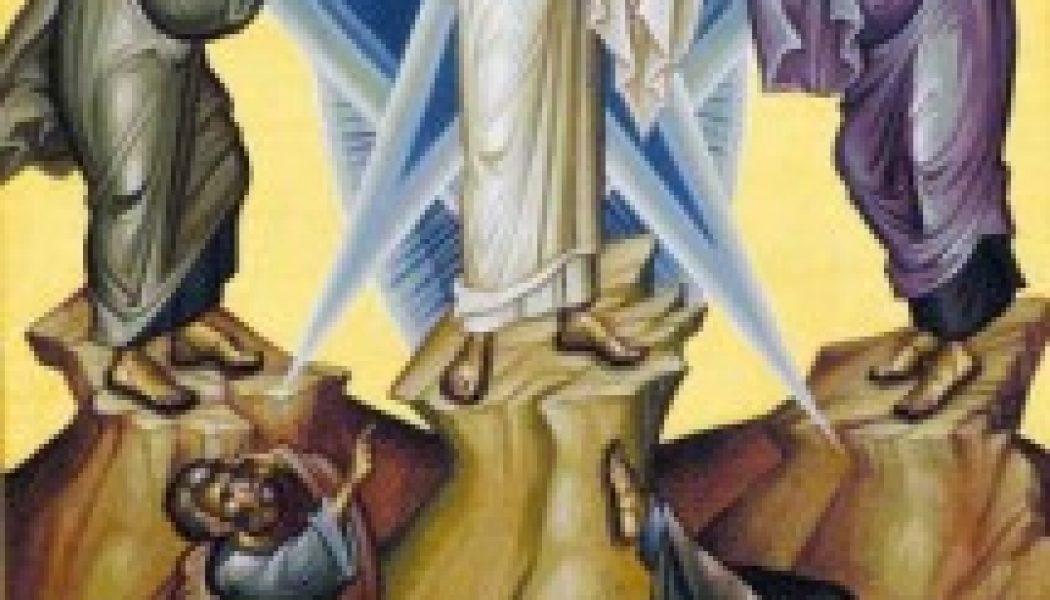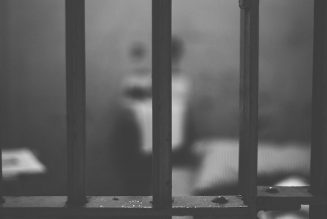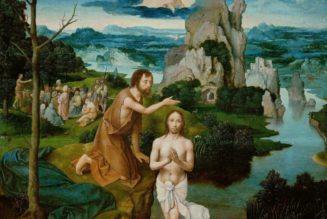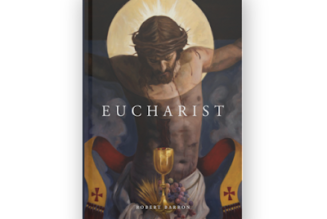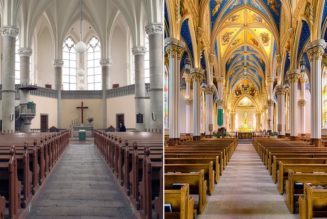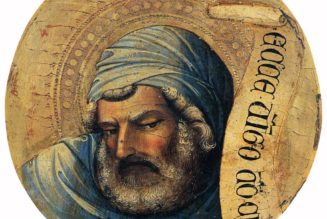 The second Sunday of Lent always features the Transfiguration. This is because we are following the Lord on His final odyssey to Jerusalem, and this journey up Mt. Tabor was one of His stops (with Peter, James, and John).
The second Sunday of Lent always features the Transfiguration. This is because we are following the Lord on His final odyssey to Jerusalem, and this journey up Mt. Tabor was one of His stops (with Peter, James, and John).
It is commonly held that Jesus did this to prepare His apostles for the difficult days ahead. There’s a line from an old spiritual that says, “Sometimes I’m up, sometimes I’m down, sometimes I’m almost on the ground … but see what the end shall be.” This is what the Lord is doing here: He is showing us what the end shall be. There is a cross to get through but there is glory on the other side.
The purpose in placing the account of the Transfiguration here is that it helps describe the pattern of the Christian life, which is the paschal mystery. We are always dying and rising with Christ in repeated cycles as we journey to an eternal Easter (cf 2 Cor4:10). This Gospel shows forth the pattern of the cross: the climb, the rising, and the glory of the mountaintop. Then it is back down the mountain again only to climb another one (Golgotha), and through it find another glory (Easter Sunday). Let’s look at today’s Gospel in three stages.
I The Purpose of Trials – Jesus took Peter, James, and John and led them up a high mountain apart by themselves.
We often pass over the fact that they had to climb that mountain, no easy task.
Anyone who has been to Mt. Tabor can attest to its altitude: almost 2000 feet. Ascending it likely took the better part of a day and was probably somewhat dangerous. Looking down from the top on the Jezreel Valley (a.k.a. Megiddo or Armageddon) provides a view similar to what one would see out an airplane window.
So we have here a symbol of the cross and of struggle. A climb up the rough side of the mountain was likely exhausting, testing their strength.
I have it on the best of authority that as they climbed they were singing gospel songs like this one: “I’m comin’ up on the rough side of the mountain, and I’m doin’ my best to carry on!” Another song says, “My soul looks back and wonders how I got over!” Yet another says, “We are climbing Jacob’s ladder, every round goes higher, higher.”
This climb reminds us of life. Often we have had to climb, to endure, to have our strength tested. Perhaps it was the climb of earning a college degree. Perhaps it was the climb of raising children or building a career. What of real value do you have that did not come at the price of a climb, of effort and struggle?
Most of us know that although the climb is difficult, there is glory at the top if we but endure. Life’s difficulties are often the prelude to success and greater strength.
Although we might wish that life had no struggles, it would seem that the Lord intends them for us, for the cross alone leads to true glory. Where would we be without some of the crosses in our life? Let’s ponder some of the purposes of problems:
God uses problems to DIRECT us. Sometimes God must light a fire under you to get you moving. Problems often point us in new directions and motivate us to change. Is God trying to get your attention? Sometimes it takes a painful situation to make us change our ways. Proverbs 20:30 says, Blows and wounds cleanse away evil, and beatings purge the inner most being. Another old gospel song speaks of the need for suffering to keep us focused on God: “Now the way may not be too easy, but you never said it would be. ‘Cause when our way gets a little too easy, you know we tend to stray from thee.” Yes, God sometimes uses problems to direct our steps to Him.
God uses problems to INSPECT us. People are like tea bags: if you want to know what’s inside them, just drop them into hot water! Has God ever tested your faith with a problem? What do problems reveal about you? Our problems have a way of helping to see what we’re really made of. I have discovered many strengths I never knew I had through trials. There is a test in every testimony and trials have a way of purifying and strengthening our faith as well as inspecting it to see whether it is genuine. 1 Peter 1:6 says, In this you greatly rejoice, though now for a little while you may have had to suffer grief in all kinds of trials. These trials are only to test your faith, to see whether or not it is strong and pure.
God uses problems to CORRECT us. There are some lessons we learn only through pain and failure. When you were a child, it’s likely that your parents told you not to touch a hot stove, but you probably really learned by being burned. Sometimes we only learn the value of something (e.g., health, money, a relationship) by losing it. Scripture says, It was good for me to be afflicted so that I might learn your decrees (Psalm 119:71-72). Before I was afflicted, I strayed. But now I keep you word (Psalm 119:67).
God uses problems to PROTECT us. A problem can be a blessing in disguise if it prevents you from being harmed more seriously. A man was fired for refusing to do something unethical that his boss had asked him to do. Although his unemployment was a problem, it saved him from being sent to prison when management’s actions were finally discovered. In Genesis 50:20, Joseph speaks to his brothers: You intended to harm me, but God intended it for good to accomplish what is now being done, the saving of many lives.
God uses problems to PERFECT us. When responded to properly, problems are character builders. God is far more interested in your character than your comfort. Romans 5:3 says, We can rejoice, too, when we run into problems and trials, for we know that they are good for us they help us learn to be patient. And patience develops strength of character in us and helps us trust God more each time we use it until finally our hope and faith are strong and steady. Peter 1:7 says, You are being tested as fire tests gold and purifies it and your faith is far more precious to God than mere gold; so if your faith remains strong after being tried in the fiery trials, it will bring you much praise and glory and honor on the day of his return.
So here it is, the cross symbolized by the climb; but after the cross comes the glory.
II The Productiveness of Trials – And he was transfigured before them, and his clothes became dazzling white, such as no fuller on earth could bleach them. Then Elijah appeared to them along with Moses, and they were conversing with Jesus. Then Peter said to Jesus in reply, “Rabbi, it is good that we are here! Let us make three tents: one for you, one for Moses, and one for Elijah.” He hardly knew what to say, they were so terrified. Then a cloud came, casting a shadow over them; from the cloud came a voice, “This is my beloved Son. Listen to him.”
All the climbing has paid off. Now comes the fruit of all that hard work. The Lord gives them a glimpse of glory! They get to see the glory that Jesus has always had with the Father. He is dazzlingly bright. A similar vision from the Book of Revelation gives us more detail:
I turned around to see the voice that was speaking to me. And when I turned I saw seven golden lampstands, and among the lampstands was someone like a son of man, dressed in a robe reaching down to his feet and with a golden sash around his chest. The hair on his head was white like wool, as white as snow, and his eyes were like blazing fire. His feet were like bronze glowing in a furnace, and his voice was like the sound of rushing waters. In his right hand he held seven stars, … His face was like the sun shining in all its brilliance. When I saw him, I fell at his feet as though dead. Then he placed his right hand on me and said: “Do not be afraid. I am the First and the Last. I am the Living One; I was dead, and now look, I am alive for ever and ever! And I hold the keys of death and Hades” (Rev 1:12-17).
Yes, all the climbing has paid off. Now comes the glory, the life, the reward for endurance and struggle. Are you enjoying any of the fruits of your crosses now? If we have carried our crosses in faith, it has made us more confident, stronger. Some of us have discovered gifts, abilities, and endurance we never knew we had. Our crosses have brought us life! St. Paul said, that this momentary affliction is producing for us a weight of glory beyond all compare (2 Cor 4:14). He also said, For I consider that the sufferings of this present time are not worth comparing with the glory that is to be revealed to us (Rom 8:18).
So here is the glory that comes after the climb. Here is the life that comes from the cross.
III. The Pattern of Trials – Suddenly, looking around, they no longer saw anyone but Jesus alone with them. As they were coming down from the mountain, he charged them not to relate what they had seen to anyone, except when the Son of Man had risen from the dead.
Although Peter wanted to stay, Jesus makes it clear that they must go down the mountain for the time being and walk a very dark valley to another hill (Golgotha); for now, the pattern must repeat. The cross has led to glory, but more crosses are needed before the final glory. An old spiritual says, “We are climbing Jacob’s ladder … every round goes higher, higher, soldiers of the cross!
This is our life. Always carrying within our self the dying of Christ so also that [the rising of Christ], the life of Christ may be manifest in us (cf 2 Cor 4:10).
There are difficult days ahead for Jesus and the Apostles, but the crosses lead to lasting glory. This is our life too. The paschal mystery is the pattern and rhythm of our life.
Here is an excerpt from the song “We Are Climbing Jacob’s Ladder.” The song repeats, “… every round goes higher, higher.” One can almost imagine a spiral staircase as the rounds get pitched higher musically. This is the pattern of our life: we die with Christ so as to live with Him. Each time we come back around to the cross, or back around to glory, we are one round higher and one level closer to final glory.
[embedded content]
